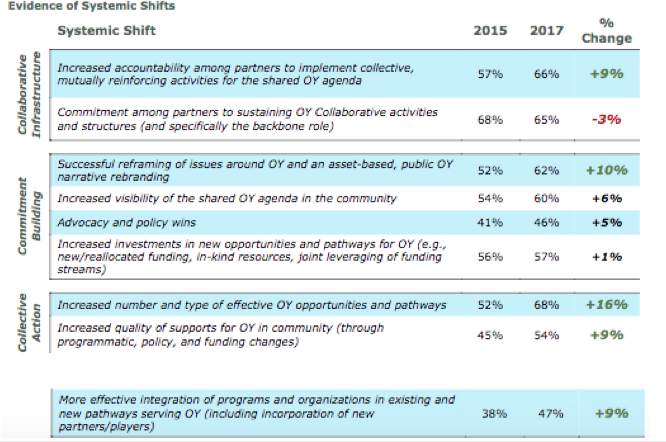
Since 2012, the Aspen Institute Forum for Community Solutions has worked with partners across the country to support opportunity youth, who are 16- to 24-year-olds who are out of work and school. The Opportunity Youth Forum (OYF) was launched out of this focus to connect youth to education and employment opportunities in 24 tribal, urban, and rural communities from all around the U.S.
The OYF continues to have a tremendous year of development and growth, as evidenced through findings from Equal Measure’s Opportunity Youth Incentive Fund Annual Evaluation Report, the third and most recent independent evaluation of the OYF.
The evaluation indicates that in this past year communities have strengthened partnerships and community commitments to supporting opportunity youth while also instituting major organizational and policy changes to ensure success for youth. The figure below outlines the major changes that have taken place over the last year:

The evaluation also found that in addition to making these critical changes, collaborative partnerships directly affect youth outcomes in communities through piloting new programs and scaling others. This has resulted in directly serving approximately 38,000 youth between 2015-2017. While sustained funding for collaboratives remains a challenge, the evaluation found that collaboratives have made headway leveraging public resources for this work.
Additional results of the evaluation:
1) Collaboratives have developed strong partnerships indicated by robust partner engagement and shared accountability toward a common goal. Specifically, 90 percent of collaboratives had participation of senior-level organizational and institutional partners with the power to change organizational polices or practices, or to align in-kind resources in support of the collaborative’s work.
2) The majority of collaboratives who have made progress achieved these two narrative changes: creating a frame that opportunity youth are assets and emphasizing the systemic multiple hardships (versus individual) these young people face.
3) Collaborative partners made a range of organizational policy and practice changes that demonstrate significant promise and progress in changing systems and pathways to support opportunity youth.
4) Collaboratives are authentically engaging youth as partners in the opportunity youth work.
More detail on the above findings, and other useful information for practitioners, collaboratives, funders, and policy makers can be found in the full evaluation.